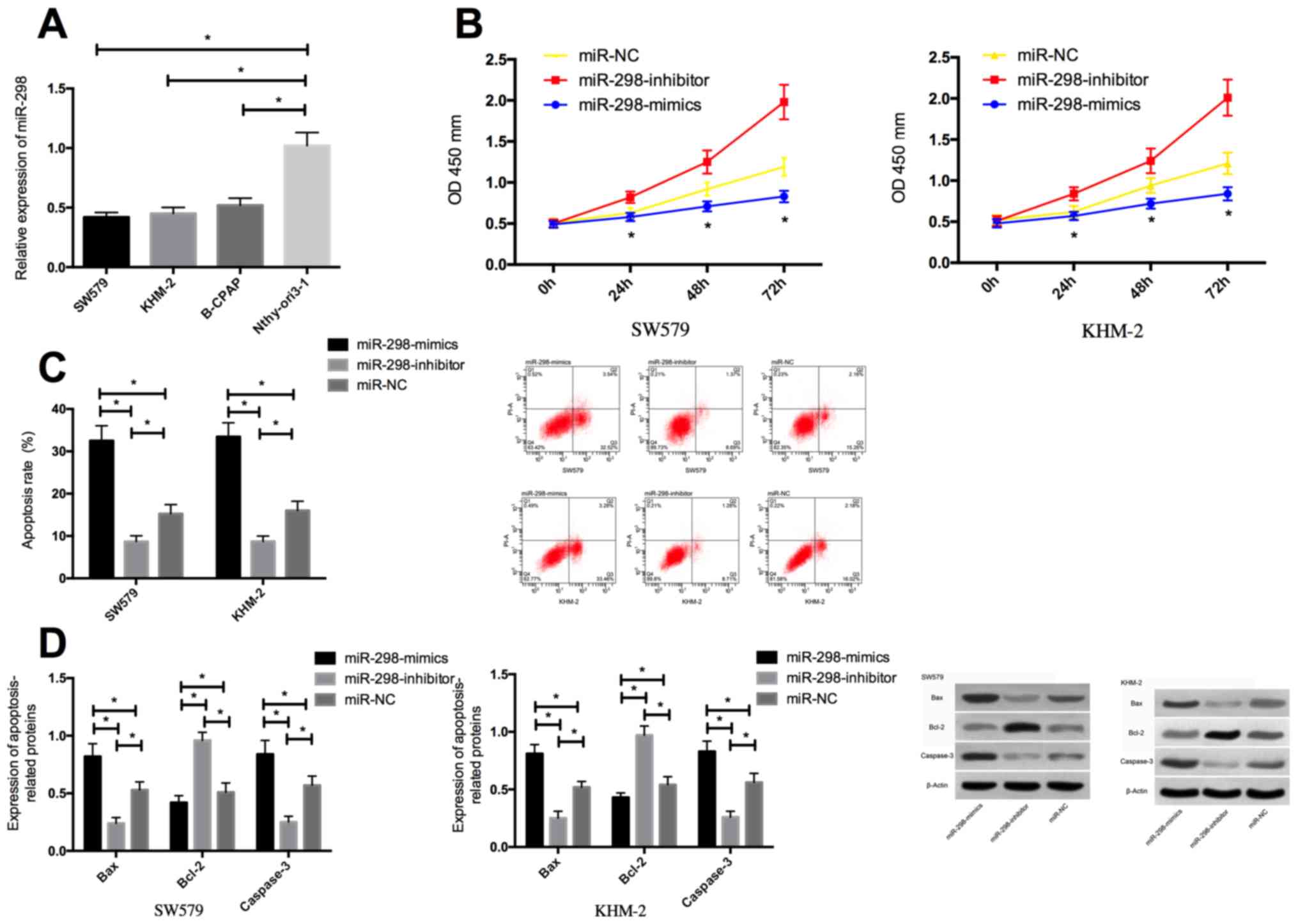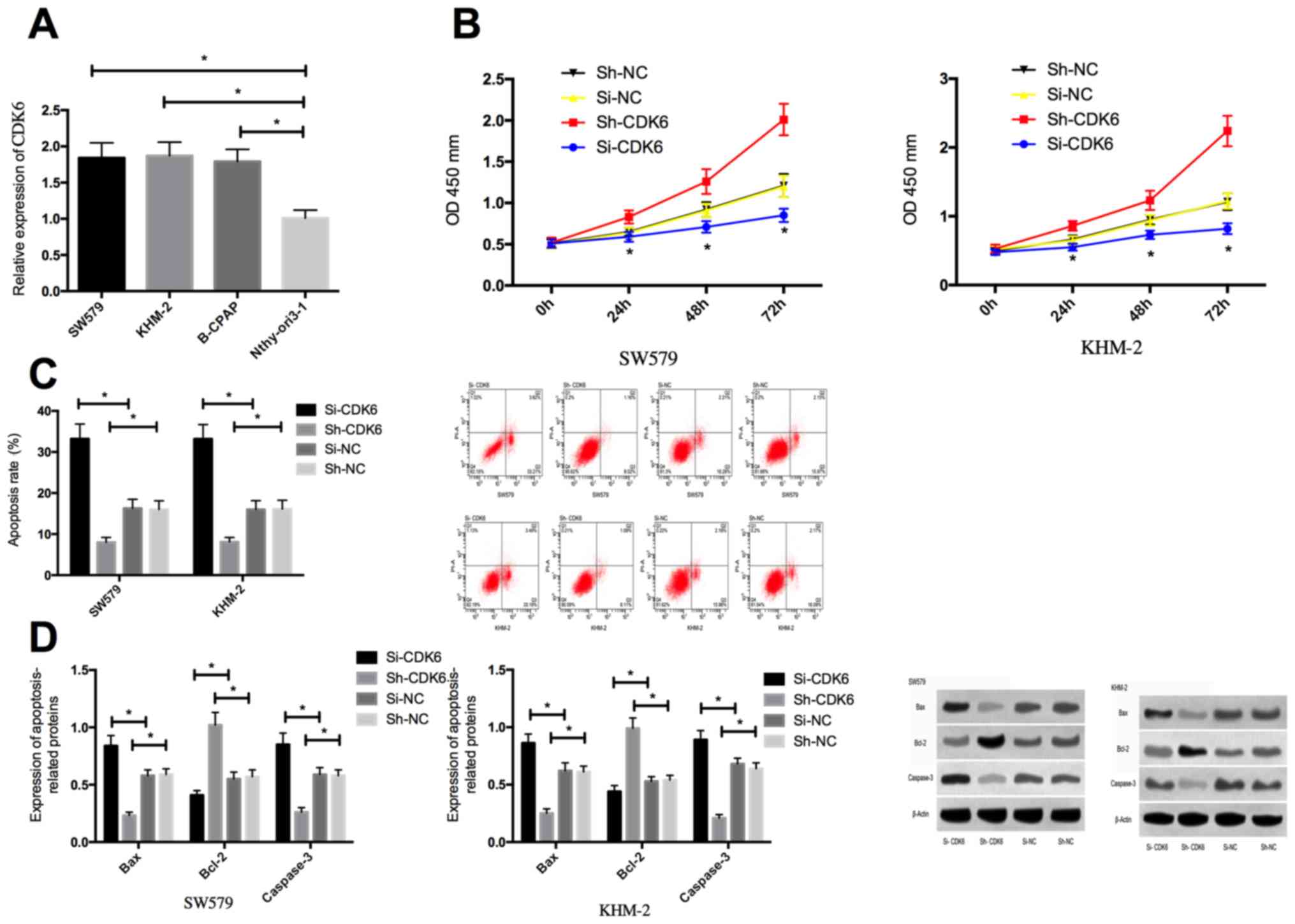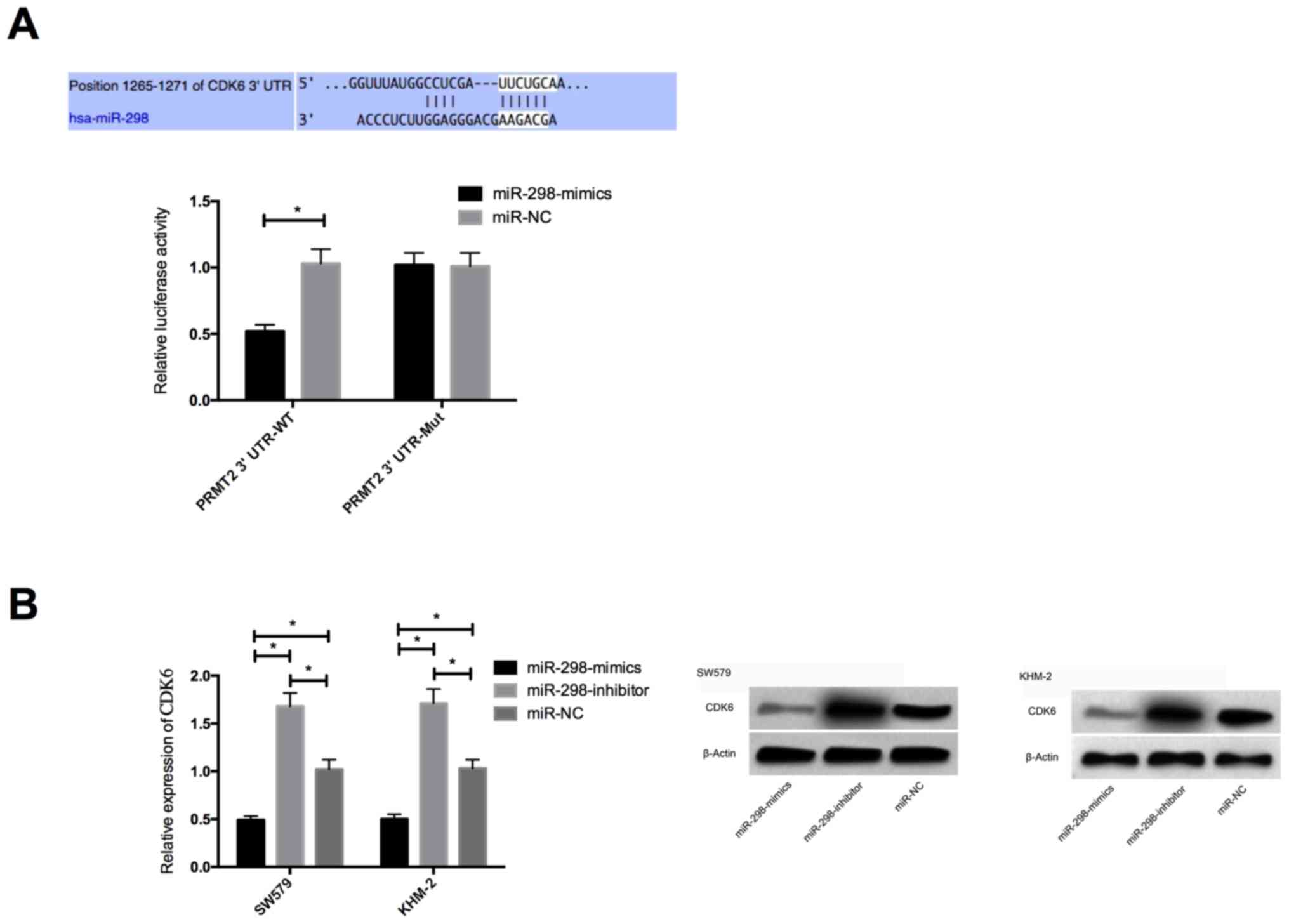|
1
|
Zhang T, He L, Sun W, Qin Y, Zhang P and
Zhang H: 1,25-Dihydroxyvitamin D3 enhances the susceptibility of
anaplastic thyroid cancer cells to adriamycin-induced apoptosis by
increasing the generation of reactive oxygen species. Mol Med Rep.
20:2641–2648. 2019.PubMed/NCBI
|
|
2
|
Luo Y, Hao T, Zhang J, Zhang M, Sun P and
Wu L: MicroRNA-592 suppresses the malignant phenotypes of thyroid
cancer by regulating lncRNA NEAT1 and downregulating NOVA1. Int J
Mol Med. 44:1172–1182. 2019.PubMed/NCBI
|
|
3
|
Bai J, Gao Y, Du Y, Yang X and Zhang X:
MicroRNA-300 inhibits the growth of hepatocellular carcinoma cells
by downregulating CREPT/Wnt/β-catenin signaling. Oncol Lett.
18:3743–3753. 2019.PubMed/NCBI
|
|
4
|
Zou L, Gao Z, Zeng F, Xiao J, Chen J, Feng
X, Chen D, Fang Y, Cui J, Liu Y, et al: Sulfasalazine suppresses
thyroid cancer cell proliferation and metastasis through T-cell
originated protein kinase. Oncol Lett. 18:3517–3526.
2019.PubMed/NCBI
|
|
5
|
Fuziwara CS, Saito KC and Kimura ET:
Interplay of TGFβ signaling and microRNA in thyroid cell loss of
differentiation and cancer progression. Arch Endocrinol Metab.
63:536–544. 2019.PubMed/NCBI
|
|
6
|
Shi D, Wang H, Ding M, Yang M, Li C, Yang
W and Chen L: MicroRNA-26a-5p inhibits proliferation, invasion and
metastasis by repressing the expression of Wnt5a in papillary
thyroid carcinoma. OncoTargets Ther. 12:6605–6616. 2019. View Article : Google Scholar
|
|
7
|
Jin J, Zhang J, Xue Y, Luo L, Wang S and
Tian H: miRNA-15a regulates the proliferation and apoptosis of
papillary thyroid carcinoma via regulating AKT pathway. OncoTargets
Ther. 12:6217–6226. 2019. View Article : Google Scholar
|
|
8
|
Mo Y, He L, Lai Z, Wan Z, Chen Q, Pan S,
Li L, Li D, Huang J, Xue F, et al: LINC01287/miR-298/STAT3 feedback
loop regulates growth and the epithelial-to-mesenchymal transition
phenotype in hepatocellular carcinoma cells. J Exp Clin Cancer Res.
37:1492018. View Article : Google Scholar : PubMed/NCBI
|
|
9
|
Zhou F, Chen J and Wang H: MicroRNA-298
inhibits malignant phenotypes of epithelial ovarian cancer by
regulating the expression of EZH2. Oncol Lett. 12:3926–3932. 2016.
View Article : Google Scholar : PubMed/NCBI
|
|
10
|
Meyerson M and Harlow E: Identification of
G1 kinase activity for cdk6, a novel cyclin D partner. Mol Cell
Biol. 14:2077–2086. 1994. View Article : Google Scholar : PubMed/NCBI
|
|
11
|
Ferrari SM, Fallahi P, Galdiero MR,
Ruffilli I, Elia G, Ragusa F, Paparo SR, Patrizio A, Mazzi V,
Varricchi G, et al: Immune and inflammatory cells in thyroid cancer
microenvironment. Int J Mol Sci. 20:202019. View Article : Google Scholar
|
|
12
|
Liu W: lncRNA LINC-PINT inhibits cancer
cell proliferation, invasion, and migration in osteosarcoma by
downregulating miRNA-21. Cancer Biother Radiopharm. 34:258–263.
2019. View Article : Google Scholar : PubMed/NCBI
|
|
13
|
Hu S, Liao Y, Zheng J, Gou L, Regmi A,
Zafar MI and Chen L: In silico integration approach reveals key
microRNAs and their target genes in follicular thyroid carcinoma.
BioMed Res Int. 2019:27251922019. View Article : Google Scholar : PubMed/NCBI
|
|
14
|
Cao N, Mu L, Yang W, Liu L, Liang L and
Zhang H: MicroRNA-298 represses hepatocellular carcinoma
progression by inhibiting CTNND1-mediated Wnt/β-catenin signaling.
Biomed Pharmacother. 106:483–490. 2018. View Article : Google Scholar : PubMed/NCBI
|
|
15
|
Jin Y-P, Hu Y-P, Wu X-S, Wu YS, Ye YY, Li
HF, Liu YC, Jiang L, Liu FT, Zhang YJ, et al: miR-143-3p targeting
of ITGA6 suppresses tumour growth and angiogenesis by
downregulating PLGF expression via the PI3K/AKT pathway in
gallbladder carcinoma. Cell Death Dis. 9:1822018. View Article : Google Scholar : PubMed/NCBI
|
|
16
|
Lam PY, Di Tomaso E, Ng HK, Pang JC,
Roussel MF and Hjelm NM: Expression of p19INK4d, CDK4, CDK6 in
glioblastoma multiforme. Br J Neurosurg. 14:28–32. 2000. View Article : Google Scholar : PubMed/NCBI
|
|
17
|
Mendrzyk F, Radlwimmer B, Joos S,
Kokocinski F, Benner A, Stange DE, Neben K, Fiegler H, Carter NP,
Reifenberger G, et al: Genomic and protein expression profiling
identifies CDK6 as novel independent prognostic marker in
medulloblastoma. J Clin Oncol. 23:8853–8862. 2005. View Article : Google Scholar : PubMed/NCBI
|
|
18
|
Schwartz EI, Smilenov LB, Price MA,
Osredkar T, Baker RA, Ghosh S, Shi FD, Vollmer TL, Lencinas A,
Stearns DM, et al: Cell cycle activation in postmitotic neurons is
essential for DNA repair. Cell cycle. 6:318–329. 2007. View Article : Google Scholar : PubMed/NCBI
|
|
19
|
Grossel MJ and Hinds PW: From cell cycle
to differentiation: The role of cdk6 continues to expand. Cell
Cycle. 5:266–270. 2006. View Article : Google Scholar : PubMed/NCBI
|
|
20
|
Handschick K, Beuerlein K, Jurida L,
Bartkuhn M, Müller H, Soelch J, Weber A, Dittrich-Breiholz O,
Schneider H, Scharfe M, et al: Cyclin-dependent kinase 6 is a
chromatin-bound cofactor for NF-κB-dependent gene expression. Mol
Cell. 53:193–208. 2014. View Article : Google Scholar : PubMed/NCBI
|
|
21
|
Li B, He H, Tao BB, Zhao ZY, Hu GH, Luo C,
Chen JX, Ding XH, Sheng P, Dong Y, et al: Knockdown of CDK6
enhances glioma sensitivity to chemotherapy. Oncol Rep. 28:909–914.
2012.PubMed/NCBI
|
|
22
|
Ma H, Chen J, Pan S, Dai J, Jin G, Hu Z,
Shen H and Shu Y: Potentially functional polymorphisms in cell
cycle genes and the survival of non-small cell lung cancer in a
Chinese population. Lung Cancer. 73:32–37. 2011. View Article : Google Scholar : PubMed/NCBI
|


















